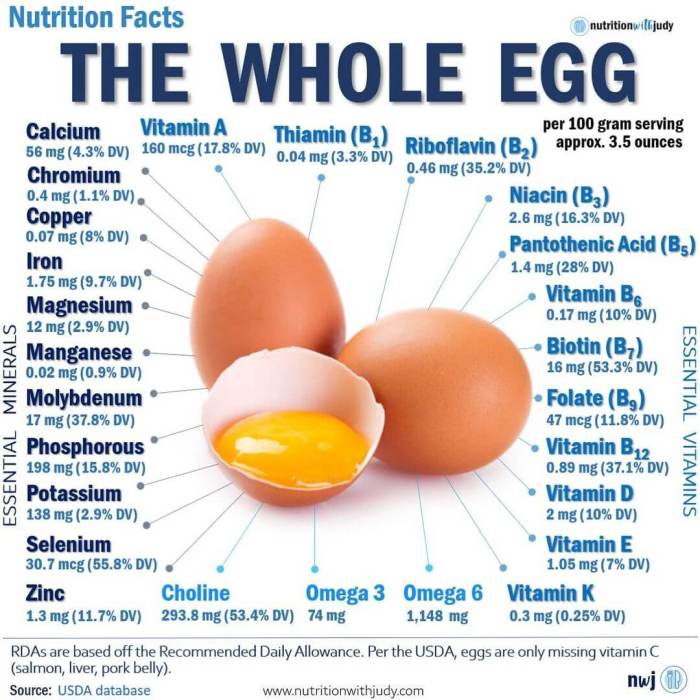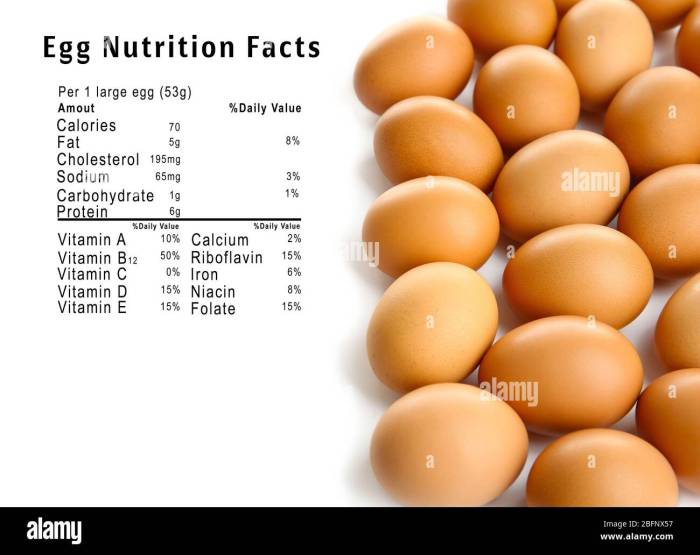Two Eggs in a Balanced Diet: 2 Eggs Nutrition Facts

2 eggs nutrition facts – The humble egg, a symbol of new beginnings and life itself, holds a potent nutritional power often underestimated. Incorporating two eggs into a balanced daily diet can be a profound act of self-care, nourishing the body and spirit with its rich tapestry of vitamins, minerals, and essential nutrients. This isn’t merely about physical sustenance; it’s about aligning our inner landscape with the vibrant energy of nature’s bounty.Two eggs offer a potent blend of high-quality protein, essential fatty acids, and vital micronutrients that support a wide range of bodily functions.
Their consumption can be seen as a daily ritual, a mindful act of nurturing the temple of your being.
Benefits of Regular Egg Consumption
The regular inclusion of two eggs in a balanced diet fosters a harmonious relationship between your body and its environment. This synergy promotes a state of well-being that extends beyond mere physical health, enriching the overall quality of life. The benefits are multifaceted and deeply interconnected, contributing to a holistic sense of vitality.
Yo, two eggs are a solid protein punch, right? But if you’re looking for something a bit different, check out the cottage cheese nutrition facts – it’s surprisingly similar in protein content. Then again, nothing beats a couple of sunny-side up eggs for a quick and easy protein fix, man!
- Enhanced Protein Intake: Eggs are a complete protein source, providing all nine essential amino acids crucial for muscle growth, repair, and overall tissue maintenance. This is vital for maintaining energy levels and supporting active lifestyles.
- Improved Cognitive Function: Choline, a nutrient abundant in eggs, plays a vital role in brain health and cognitive function, contributing to improved memory and focus. Studies have shown a correlation between choline intake and reduced risk of cognitive decline.
- Strengthened Immune System: Eggs are rich in vitamins and minerals, including selenium and vitamin D, both of which are essential for a robust immune system. These nutrients act as powerful antioxidants, protecting cells from damage and bolstering the body’s natural defenses.
- Improved Eye Health: Lutein and zeaxanthin, carotenoids found in egg yolks, are crucial for maintaining eye health and reducing the risk of age-related macular degeneration. These nutrients act as natural filters, protecting the eyes from harmful blue light.
- Support for Healthy Bones: Vitamin D, along with other nutrients in eggs, contributes to bone health and reduces the risk of osteoporosis. This is especially important for maintaining strong bones throughout life.
Potential Risks and Mitigation Strategies, 2 eggs nutrition facts
While eggs offer numerous benefits, it’s important to acknowledge potential drawbacks and adopt strategies for mitigating any associated risks. A balanced approach, informed by awareness, ensures that the benefits outweigh any potential concerns.
- High Cholesterol: Egg yolks contain cholesterol. However, recent research suggests that dietary cholesterol has a less significant impact on blood cholesterol levels than previously believed. Nevertheless, individuals with pre-existing high cholesterol should monitor their intake and consult with their healthcare provider.
- Salmonella Risk: Proper handling and cooking of eggs are crucial to minimize the risk of salmonella infection. Always ensure eggs are thoroughly cooked until the yolk and white are firm. Refrigerate eggs promptly after purchase and avoid consuming raw or undercooked eggs.
- Allergies: Egg allergies are relatively common, especially in children. Individuals with known egg allergies should strictly avoid consuming eggs. If you suspect an egg allergy, consult an allergist for proper diagnosis and management.
Egg Preparation and Nutritional Value

The humble egg, a symbol of new beginnings and nourishment, offers a profound lesson in the transformative power of preparation. Just as the potential of a seed lies dormant until nurtured by the earth, so too does the full nutritional spectrum of an egg unfold through mindful cooking. The method by which we prepare our eggs significantly influences their nutritional profile and the bioavailability of their precious contents.
Understanding this delicate dance between culinary technique and nutritional outcome allows us to unlock the egg’s full potential for spiritual and physical well-being.The following table illustrates the nutritional variations arising from different cooking methods for two large eggs. Note that these values are approximate and can vary based on factors such as egg size and cooking time.
Nutritional Comparison of Two Eggs Prepared Differently
| Cooking Method | Calories (approx.) | Protein (grams) | Fat (grams) | Cholesterol (mg) |
|---|---|---|---|---|
| Boiled | 155 | 12 | 10 | 372 |
| Fried (in 1 tbsp oil) | 185 | 12 | 14 | 372 |
| Scrambled | 165 | 12 | 11 | 372 |
| Poached | 150 | 12 | 9 | 372 |
Impact of Cooking Methods on Nutrient Bioavailability
Cooking methods affect the bioavailability of certain nutrients within the egg. For example, while boiling preserves most nutrients, frying can lead to some nutrient loss due to heat and the addition of oil. The Maillard reaction, a chemical process occurring during high-heat cooking like frying and scrambling, creates flavorful compounds but can also slightly reduce the availability of certain vitamins.
However, this reduction is often minimal compared to the overall nutritional benefits of consuming eggs. The gentle heat of poaching minimizes nutrient loss while retaining the delicate texture of the egg white. Ultimately, the key is balance and mindful preparation.
Healthy and Nutritious Two-Egg Preparations
The preparation of two eggs can be a meditative act, a mindful connection to the source of nourishment. The following recipes illustrate healthy and delicious ways to harness the egg’s potential.
Recipe 1: Spiced Poached Eggs with SpinachIngredients: Two eggs, 1 cup water, 1/4 teaspoon turmeric, pinch of black pepper, 1 cup fresh spinach.Instructions: Gently simmer water with turmeric and pepper. Create a gentle swirl in the water and carefully crack eggs into the water. Poach for 3-4 minutes for runny yolks. Serve atop wilted spinach. The vibrant colors and warming spices enhance both the physical and spiritual nourishment.
Recipe 2: Baked Eggs with Mushrooms and TomatoesIngredients: Two eggs, 1/2 cup sliced mushrooms, 1/2 cup chopped tomatoes, 1 tablespoon chopped fresh herbs (parsley, chives), salt and pepper to taste.Instructions: Preheat oven to 350°F (175°C). Sauté mushrooms and tomatoes until softened. Place in oven-safe ramekins, crack eggs on top, season with herbs, salt, and pepper. Bake for 12-15 minutes, or until eggs are set. The earthy flavors of mushrooms and tomatoes complement the richness of the eggs, creating a nourishing and grounding experience.
Quick FAQs
Are two eggs a day too much cholesterol?
For most healthy individuals, two eggs a day are unlikely to significantly raise blood cholesterol levels. However, those with pre-existing high cholesterol should monitor their intake and consult a doctor.
Can I eat eggs if I have diabetes?
Eggs can be part of a diabetic diet, but portion control is important due to their carbohydrate content. They offer protein and other nutrients beneficial for managing diabetes.
What are the best ways to cook eggs to preserve nutrients?
Generally, gentler cooking methods like poaching or boiling retain more nutrients than frying. Minimizing cooking time also helps preserve vitamins.
Are there any alternatives to chicken eggs?
Yes, alternatives include duck eggs, quail eggs, and plant-based egg substitutes. Nutritional content varies, so check labels for specifics.
